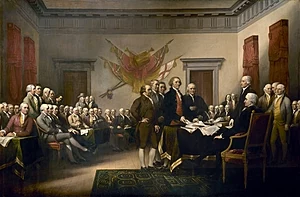——Dan Schultz is a friend of mine from 12 years back. He is the creator of the Precinct Project, and author of How to Get Into the Real Game of Politics Where You Live To Help President Donald J Trump Make America Great Again, (2017) available at Amazon in paperback). It’s an important outline as how to gain greater power in your state, as a GOP precinct chairman, many of those seats still vacant.) When we were together at RedState.com he was always correcting my spelling, in part because I sometimes spell how people from Appalachia actually speak.
——Some of you old RedState alum knew him as ColdWarrior.
——We are both big believers in ordinary grass roots citizens taking a greater hand in how our government at every level is managed. I was with him when he made a private presentation to the late-Herman Cain in Las Vegas in 2010, as he was considering his 2011-2012 presidential run. Mr Cain helped him get the Precinct Project ball rolling. Dan is a graduate of West Point (Intelligence), his first posting, Ft Huachuca, my last Army posting about 10 years earlier, a practicing attorney in the Phoenix area, and member of the Maricopa County GOP establishment. We both watched Linda Brinkman give the Arizona GOP what-fer during her testimony before the Senate hearings in Phoenix Tuesday.
——Dan sent this letter to me last night, via email, and I asked his permission to reprint it here. He can be contacted at @DanScultz2 on Twitter.
It speaks for itself, about the Arizona GOP House and Senate reclaiming their plenary Power
Hi Kelly,
I texted you a brief outline of what is possible, regardless of whether you can get all the Republican senators and representatives to act.
Briefly, here is an outline of a strategy to have the Arizona Republican House and Senate members publicly reclaim their plenary power granted by the U.S. Constitution to choose Arizona’s presidential electors. Let’s assume that ALL Republicans in the AZ House and Senate do this.
Article II, section 1, clause 2 gives plenary authority (that is, directly to the legislature from the supreme law of the land, the U.S. Constitution) to the state legislatures to appoint presidential electors:
Each State shall appoint, in such Manner as the Legislature thereof may direct, a Number of Electors, equal to the whole Number of Senators and Representatives to which the State may be entitled in the Congress: but no Senator or Representative, or Person holding an Office of Trust or Profit under the United States, shall be appointed an Elector.
https://constitution.congress.gov/browse/article-2/section-1/clause-2/
Bush v. Gore recognized that
[t]he individual citizen has no federal constitutional right to vote for electors for the President of the United States unless and until the state legislature chooses a statewide election as the means to implement its power to appoint members of the electoral college. U. S. Const., Art. II, § 1. This is the source for the statement in McPherson v. Blacker, 146 U. S. 1, 35 (1892), that the state legislature’s power to select the manner for appointing electors is plenary; it may, if it so chooses, select the electors itself, which indeed was the manner used by state legislatures in several States for many years after the framing of our Constitution. Id., at 28-33. History has now favored the voter, and in each of the several States the citizens themselves vote for Presidential electors. . . . The State, of course, after granting the franchise in the special context of Article II, can take back the power to appoint electors. See id., at 35 (“’[T]here is no doubt of the right of the legislature to resume the power at any time, for it can neither be taken away nor abdicated’”) (quoting S. Rep. No. 395, 43d Cong., 1st Sess., 9 (1874)).
https://tile.loc.gov/storage-services/service/ll/usrep/usrep531/usrep531098/usrep531098.pdf
In other words, the state legislators, upon learning that the popular vote process has been invalid, can take back the power to choose electors. Period.
McPherson v. Blacker, 146 U.S. 1, 33-35, “makes clear that that the plenary power granted the state legislatures to choose the presidential electors cannot be infringed upon by a state constitution, a state statute, or a governor; the power to choose the electors may be reclaimed by the legislators at any time and for any reason.”
(Sorry, I’m unable to reprint some highlighted quotes, but Dan’s restatement here will suffice.
(The entire decision can be read here: McPherson v. Blacker :: 146 U.S. 1 (1892) :: Justia US Supreme Court Center)
Thus, the Republican House and Senate members, in their respective chambers — now enjoying a majority vote position – have the political power, granted by the U.S. Constitution, to unilaterally exercise their plenary power to reclaim their constitutional right to choose the presidential electors. They may meet anywhere and in any fashion they want to declare, by majority vote in each chamber, their reclamation of their constitutional power to choose the presidential electors. “Whatever provisions may be made by statute, or by the state constitution, to choose electors by the people, there is no doubt of the right of the legislature to resume the power at any time, for it can neither be taken away nor abdicated. Senate Rep. 1st Sess. 43 Cong. No. 395.” McPherson v. Blacker, 146 U.S. 1, 35 (1892).
A good outline of the time frame and what to accomplish before Dec. 8:
Understanding the Electoral Process
December 2, 2020 by Jordan Henry
The electoral process is a vital part of our constitutional republic, but it can be difficult to understand without the right resources. If you’d like to know a bit more about what lies ahead in the coming weeks, read on!
December 8 is the “Safe Harbor Deadline.” As established in U.S. Code and upheld by the Supreme Court in Bush v. Gore (2000), if a state officially declares a winner (known as “certifying”) by December 8, the results are binding. Presently, all six of the contested states have certified their elections in favor of Joe Biden. The federal legislature cannot overturn the certification unless more than one certification is sent from the same state (one from the legislature and one from the governor, for example).
January 6 is when the U.S. House and Senate meet in a joint session to count electoral votes and officially declare a winner. As the votes are counted, a representative and senator may jointly submit an official objection in writing. The U.S. House and Senate would then vote separately on which certification to accept after a maximum of 2 hours of debate.
If the House and Senate disagree, U.S. Code dictates that the certification endorsed by the state’s governor is accepted. However, since Article II Section 1 of the Constitution states that each state appoints electors “in such Manner as the Legislature [of the state] may direct,” the principle of yielding to the will of the governor would almost certainly be challenged in court.
State legislatures must assert their Article II authority before the December 8 Safe Harbor deadline. Mobilizing state legislatures in the six contested states should be very possible. All but Nevada have Republican control of both the state House and Senate. The process is specifically designed to move rapidly. Quick action is an absolute must to secure conservative victory.
https://www.phyllisschlafly.com/constitution/understanding-the-electoral-process/ (See the helpful, downloadable flow charts.)
The strategy going forward ought to be for one or more constitutional conservative Republican members of the AZ House and Senate to reach out to the other members to ask whether they would support the above strategy. If enough members in each chamber agree to create the voting majority needed, then assemble and vote.
If not enough Republicans in either or both chambers will carry out the above strategy, then put on record those that would and make infamous those that would not.
“THESE are the times that try men’s souls. The summer soldier and the sunshine patriot will, in this crisis, shrink from the service of their country; but he that stands by it now, deserves the love and thanks of man and woman. Tyranny, like hell, is not easily conquered; yet we have this consolation with us, that the harder the conflict, the more glorious the triumph. What we obtain too cheap, we esteem too lightly: it is dearness only that gives every thing its value. Heaven knows how to put a proper price upon its goods; and it would be strange indeed if so celestial an article as FREEDOM should not be highly rated”
― Thomas Paine, The Crisis
I have outlined above what CAN be done. Will those who we have elected to serve us step and DO it?
Who will step up?





